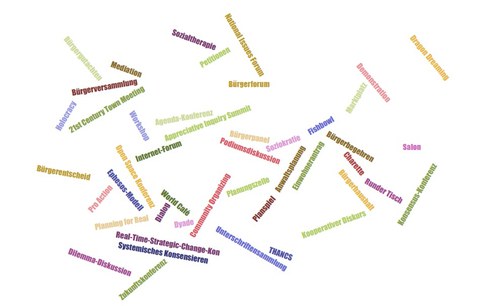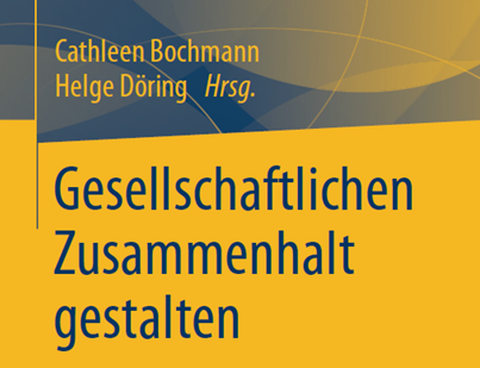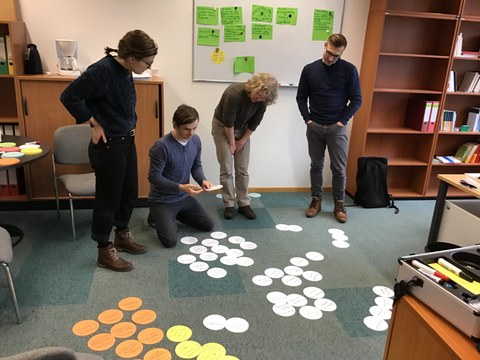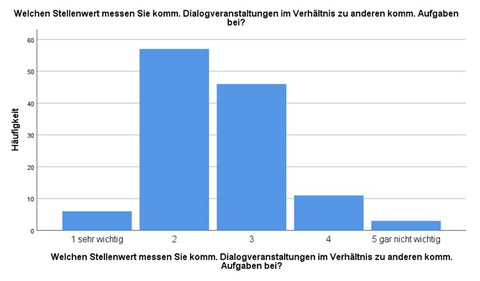Our Work
Since 2018 we have been attending dialogue events of various organizers throughout Saxony. The aim was to get to know a variety of formats and, in parallel, to develop a concept paper on forty different variations of citizen dialogues in the context of crises. The variants described there include 21st Century Town Meeting, Appreciative Inquiry Summit, Agenda Conference, Classic Citizens'; Meeting, Community Organizing, Fishbowl, Holocracy, Consensus Conference, Mediation, Planning for Real, Pro Action Café, Round Table, World Café or Future Conference. Subsequently, a typology was drawn up of which formats can be used in which phases of a crisis. This theoretical framework can be found in the article “Versammlungen in Krisenzeiten”; by Dr. Willi Hetze in our anthology “Shaping social cohesion“ (“Gesellschaftlichen Zusammenhalt gestalten“), that was published by Springer VS in early 2020.
To achieve participation, two things are needed: opportunities and the will to participate. Opportunities are largely related to the format within which the decision-making takes place. In order to gain access to the complexity of participatory formats, it is helpful to view them as negotiation stages of social reality. They have central functions such as information distribution, factual orientation, evaluation and decision-making. In the process of political decision-making, various participation formats work together and side by side, so that the above-mentioned functions do not represent a sequence, but can form individual and collective learning loops. Therefore, the decisive factor for the course and success of such a format is at what point and in what context it is used in the negotiation process, whether it is singularly set or is to accompany the discourse recurrently.
Literature
Our publications are predominantely in German so far. Our main work results were published at Springer Verlag. Link
Further publications :
- Bochmann, Cathleen. 2022. Bürgerdialoge in Zeiten der Krise - Ethnomethodologische Fallstudien aus Sachsen. Link (German)
- Treiber, Janek. 2022. Unbeugsamer Protest? Umgang mit Corona-Leugner*innen und Maßnahmen-
gegner*innen aus Sicht der Bürgerbeteiligung in Sachsen, in: Forschungsjournal Soziale Bewegungen. (35/1), 237-249. - Gäbel, David und Ulrike Schumacher. Wir kriegen's hin! Praxisheft für kommunale Bürgerdialoge. Sächsische Landeszentrale für politische Bildung. (forthcoming)
- Bochmann, Cathleen. 2021. Miteinander Reden - Über die Nutzung und den Erfolg von Bürgerdialogen. In Vogel, Lars, Lorenz, Astrid und Pates, Rebecca (Hrsg.) Ostdeutschland 4.0 - Über die Nützlichkeit einer Kategorie. Berlin: Springer VS. (Im Erscheinen)
- Treiber, Janek und Anne Herpertz. 2020. Über die Schwierigkeiten der Thesenformulierung im Online-Dialog. Diskussionspapier. TU Dresden: Projekt KDZ. (Bericht)
- Bochmann, Cathleen und Willi Hetze. 2020. Rational Dialogue in Times of Crisis. Journal of Deliberative Democracy (im Review)
- Gäbel, David.2019. Beteiligungsformate aus Sicht kommunaler Verantwortlicher in Sachsen. Netzwerk Bürgerbeteiligung / Stiftung Mitarbeit, 04/2019 vom 16.12.2019.
Studies
The project team conducted five empirical studies in 2018 and 2019. They enabled us to obtain specific assessments of the participation culture in Saxony and to feed back the theoretical-conceptual considerations with the empirical conditions of the application of the dialogue formats.
The first survey focused on the success factors of citizen dialogues. Qualitative structured interviews with nine moderators of municipal asylum dialogues took place in July/August 2018, which were evaluated in the form of a MAXQDA-supported Grounded Theory. The results can be found in Dr. Ulrike Schumacher's article “Erfolgsfaktoren kommunaler Bürgerdialoge” in our anthology “Shaping social cohesion”.
The Saxon Citizen Dialogue Study recorded the experiences and needs of Saxon municipalities for communicative crisis management in the form of a quantitative written survey of Saxon mayors and councillors in December 2018. The results will also be published in David Gäbel / Cathleen Bochmann (2019) “Bedarfe an neuen Beteiligungsformaten” in the aforementioned anthology. Here you will also find the (German) questionnaire and the SPSS data record.
The third study was aimed at the participants of the citizens' workshops “Miteinander reden!”; of the Saxon State Chancellery. From January to July 2019, this participant survey via the Limesurvey online platform examined how communication can be successful and how civil society commitment can be improved. Here you will find the questionnaire and a short summary of the findings (both in German).
The forth study accompanied a series of 23 Online-Webtalks in summer of 2020. Under the motto of "Learning from a Crisis - Open Society in the Post-Covid Phase" citizens and experts discussed a variety of issues. Like with the citizen's workshops we examined the participant's satisfaction through a survey . Here are the results (in German) Ergebnisse.
The fifth study was dedicated to measuring the self-efficacy of participants in our annual facilitation training. The aim was to find out whether the participants' confidence in their own abilities can be increased with the help of a training course lasting several months. For this purpose, a questionnaire commonly used for self-efficacy measurements was developed. After the pretest, non-relevant items were removed using a factor analysis. The remaining 20 items were sorted into five categories (education and interaction, rules and compliance, dealing with difficulties, learning and explaining things, error management) and included in the questionnaire, which was administered to the participants before and after the training. The results show improvements in all items, although the degree of improvement varies greatly. However, it is noticeable that progress was made especially in the categories of rule setting and compliance as well as dealing with difficulties. A rough overview of the results can be found here (German).





